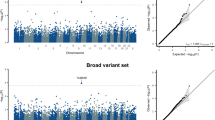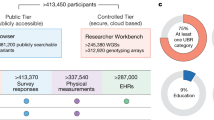Abstract
The autosomal dominant myopathy facioscapulohumeral muscular dystrophy (FSHD1, OMIM 158900) is caused by contraction of the D4Z4 repeat array on 4qter. We show that this contraction causes marked hypomethylation of the contracted D4Z4 allele in individuals with FSHD1. Individuals with phenotypic FSHD1, who are clinically identical to FSHD1 but have an unaltered D4Z4, also have hypomethylation of D4Z4. These results strongly suggest that hypomethylation of D4Z4 is a key event in the cascade of epigenetic events causing FSHD1.
This is a preview of subscription content, access via your institution
Access options
Subscribe to this journal
Receive 12 print issues and online access
$209.00 per year
only $17.42 per issue
Buy this article
- Purchase on Springer Link
- Instant access to full article PDF
Prices may be subject to local taxes which are calculated during checkout


Similar content being viewed by others
References
Amir, R.E. et al. Nat. Genet. 23, 185–188 (1999).
Tufarelli, C. et al. Nat. Genet. 34, 157–165 (2003).
Rand, E. & Cedar, H. J. Cell. Biochem. 88, 400–407 (2003).
Padberg, G.W. Facioscapulohumeral disease. (Leiden University, The Netherlands, 1982).
Wijmenga, C. et al. Nat. Genet. 2, 26–30 (1992).
van Deutekom, J.C. et al. Hum. Mol. Genet. 2, 2037–2042 (1993).
Lunt, P.W. Neuromuscul. Disord. 8, 126–130 (1998).
van Deutekom, J.C. et al. Hum. Mol. Genet. 5, 1997–2003 (1996).
Lemmers, R.J. et al. Nat.Genet. 32, 235–236 (2002).
Robertson, K.D. & Wolffe, A.P. Nat. Rev. Genet. 1, 11–19 (2000).
Randolph-Anderson, B.L. et al. Am. J. Hum. Genet. 71, 530 (2003).
Xu, G.L. et al. Nature 402, 187–191 (1999).
Kondo, T. et al. Hum. Mol. Genet. 9, 597–604 (2000).
Gabellini, D., Green, M. & Tupler, R. Cell 110, 339–248 (2002).
Jiang, G. et al. Hum. Mol. Genet. 12, 2909–2921 (2003).
Acknowledgements
We dedicate this work to the memory of Lodewijk Sandkuijl, who unexpectedly passed away during preparation of this manuscript. We thank R. ten Hove for contributing to the development of the methylation assays and C. Wijmenga and D. Smeets for providing material from individuals with ICF. Our FSHD research is made possible by the Prinses Beatrix Fonds, the Muscular Dystrophy Association USA, the FSH Society, the Stichting FSHD, the Shaw Family and the US National Institutes of Health.
Author information
Authors and Affiliations
Corresponding author
Ethics declarations
Competing interests
The authors declare no competing financial interests.
Rights and permissions
About this article
Cite this article
van Overveld, P., Lemmers, R., Sandkuijl, L. et al. Hypomethylation of D4Z4 in 4q-linked and non-4q-linked facioscapulohumeral muscular dystrophy. Nat Genet 35, 315–317 (2003). https://doi.org/10.1038/ng1262
Received:
Accepted:
Published:
Issue Date:
DOI: https://doi.org/10.1038/ng1262
This article is cited by
-
Simultaneous measurement of the size and methylation of chromosome 4qA-D4Z4 repeats in facioscapulohumeral muscular dystrophy by long-read sequencing
Journal of Translational Medicine (2022)
-
Multi-omic brain and behavioral correlates of cell-free fetal DNA methylation in macaque maternal obesity models
Nature Communications (2022)
-
Clinical and Molecular Spectrum of Muscular Dystrophies (MDs) with Intellectual Disability (ID): a Comprehensive Overview
Journal of Molecular Neuroscience (2022)
-
Facioscapulohumeral muscular dystrophy: genetics, gene activation and downstream signalling with regard to recent therapeutic approaches: an update
Orphanet Journal of Rare Diseases (2021)
-
Losing DNA methylation at repetitive elements and breaking bad
Epigenetics & Chromatin (2021)



